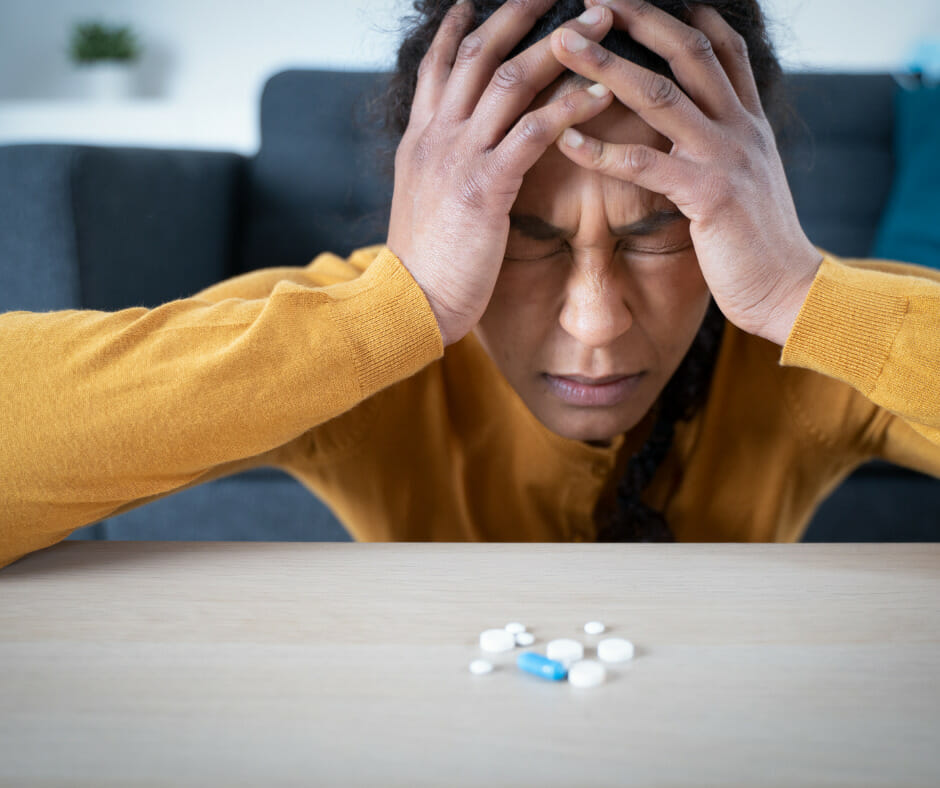Benzodiazepines are one of the most commonly prescribed medications in the United States. They can be incredibly beneficial in treating anxiety, seizures and other medical conditions when prescribed and taken appropriately.
However, when taken improperly or abused over a long period of time, benzodiazepines can lead to physical dependence and addiction. If you or someone you know is battling an addiction to benzodiazepines it’s important to seek treatment as soon as possible. Lantana Recovery offers drug rehab treatment for benzodiazepine addiction.
Below we will explore what rehab services for benzodiazepines are available and discuss how they can support individuals looking to reclaim their lives and take back control over their substance use disorder.

What are Benzodiazepines
Benzodiazepines, also known as benzos, are a type of chemical compound commonly used to treat anxiety, panic attacks, insomnia, and seizures. They work by calming the nervous system and have been prescribed in the United States since the 1960s.
Benzos are highly addictive and can cause physical and psychological dependence. In some cases, people develop a tolerance to benzos over time which makes them more susceptible to abuse. Common types of benzos include Xanax, Valium, Klonopin and Ativan.
In recent years there has been an alarming rise in benzodiazepine abuse across the US. The Substance Abuse and Mental Health Services Administration reports that between 2005-2010 there was an 80% increase in emergency department visits related to benzodiazepines misuse nationwide.
Treatment Options for Benzodiazepines Addiction
Addiction treatment at a licensed rehab facility is the recommended for breaking the cycle of Benzodiazepines addiction. If you’re looking for treatment options for benzodiazepine addiction, Lantana Recovery can help you navigate your options since there are several types of rehab services available. Especially because withdrawal from either benzodiazepines or alcohol can be life-threatening
Inpatient Rehab
Inpatient Rehab is a highly intensive form of treatment where the individual stays at a residential facility and receives around-the-clock monitoring and supervision from professional medical staff.
Generally, an inpatient rehab program lasts between up to 30 days and is designed to provide a safe, secure environment with 24/7 access to highly trained medical professionals who specialize in helping individuals to overcome substance abuse issues.
Through this program, clients are provided with intensive therapies including individual counseling sessions, group therapy activities, educational courses on substance abuse and recovery, medication management and management of co-occurring mental health disorders such as anxiety and PTSD.
At the end of inpatient treatment for benzodiazepines, clients should have a better understanding of their drug addiction and have begun to acquire tools needed for long term recovery.
Part Hospitalization Rehab
Part Hospitalization Rehab is another type of treatment that may be beneficial for those struggling with benzodiazepines addiction. This treatment options combines aspects of both inpatient treatment as well as outpatient care to create an intermediate level of care for those dealing with substance use issues.
Typically reserved for individuals whose condition does not warrant 24-hour hospitalization but still require more comprehensive support than traditional outpatient services can offer.
Part hospitalization rehab for benzodiazepines consists of 8 hours or less of daily treatment in which clients receive both therapeutic interventions such as cognitive behavioral therapy, group therapy, individual therapy, as well as medication assistant treatment depending on need.
After successful completion of the part hospitalization program, individuals will continue to receive less intensive outpatient services for a period determined by their clinicians so that they can maintain their sobriety over time.
Intensive Outpatient Rehab
Intensive outpatient rehab for benzodiazepines provides more structure than traditional outpatient services yet less intensity than residential programs or part hospitalization rehabs. This level of care typically involves 9 or more hours per week devoted to individual counseling sessions with a certified therapist as well as group therapy activities such as education classes focused on relapse prevention strategies and coping skills development workshops of how to deal with benzodiazepines addiction.
Medication management may also be included depending on the individual’s needs. Intensive outpatient rehab allows patients to live at home or in sober living while receiving treatment which makes it an ideal option for those who cannot commit to full time residential care either due to work commitments or family responsibilities at home.
Outpatient Rehab
Outpatient Rehab is the least intensive form of Benzodiazepines addiction treatment available and typically requires no more than 5-6 hours per week dedicated solely towards the recovery process at an outpatient clinic or a rehab.
During these outpatient rehab for benzo treatment, individuals receive one-on-one counseling sessions with certified therapists who focus on helping clients identify triggers that could lead them back into substance abuse behaviors as well as develop coping skills tailored specifically towards their unique situations. They may also receive medications depending on need.
The goal here is often long term sobriety however progress depends greatly upon each person’s motivation levels, accountability , commitment and willingness early on during recovery. Outpatient rehab is often recommended to individuals who are stepping down from more intensive forms of treatment as discussed above or whose addiction has not become full blown yet.
Benzodiazepines: Dependence vs. Addiction
In the realm of benzodiazepines, dependence refers to a physical and/or mental necessity or urge to consume the drug either to feel its effects or to alleviate withdrawal symptoms. It’s essentially when the body or mind becomes accustomed to a specific substance, resulting in physiological shifts that challenge an individual’s ability to quit, even if it’s detrimental.
Contrastingly, addiction is marked by an uncontrollable urge to seek and consume the drug, even if it’s adversely affecting one’s life. Those addicted to benzodiazepines often feel an intense yearning for the drug and might partake in risky activities, such as driving while impaired or combining benzodiazepines with substances like alcohol. Addiction extends beyond physical symptoms, encompassing psychological and social repercussions like impaired judgment, relational conflicts, financial woes, and legal complications.

Though both dependency and addiction can emerge from benzodiazepine misuse, they closely related but separate entities that should both be taken seriously and monitored. Dependence is typically rooted in physical adjustments, whereas addiction is tied to obsessive drug-seeking behaviors. It’s important to note that while untreated dependence might evolve into addiction, not everyone who becomes dependent will develop an addiction.
Benzodiazepines, often prescribed to manage anxiety, insomnia, and other conditions, can be beneficial when used as directed. However, their potential for dependency and accompanying adverse effects make it crucial to be aware of the signs of addiction. Recognizing these symptoms early can be pivotal in ensuring timely intervention and support for those at risk of developing an addiction.
Physical Symptoms
Physical symptoms of benzodiazepine are among the most common indicators of benzodiazepine addiction. Common physical symptoms of benzodiazepine include:
- Drowsiness
- Slurred speech
- Coordination problems
- Memory impairment
- Impaired judgment
- Headaches
- Nausea or vomiting
- Constipation
- Changes in appetite
- Low libido
Lantana Recovery can help if you or someone you know is exhibiting any of these signs after taking benzodiazepines for an extended period of time.
Psychological Symptoms
Psychological symptoms from benzodiazepine addiction are common. Psychological symptoms of benzodiazepine often include:
- Depression or mood swings
- Feelings of guilt or worthlessness
- Difficulty concentrating
- Restlessness
- Irritability
- Cravings for more drug use
- Loss of interest in activities that were once enjoyed
- Social isolation
- Financial difficulty due to excessive drug use
- Feelings of paranoia or delusions
- Hallucinations (visual or auditory)
- Increased risk-taking behaviors such as driving under the influence
- Violent behavior when attempting to obtain more drugs
These benzodiazepine psychological symptoms should not be taken lightly as they can have dangerous consequences if left untreated. Lantana Recovery can help improve the physical and psychological symptoms from benzodiazepine addiction.

Diagnosing Benzodiazepines Addiction
As mentioned, benzodiazepine addiction is a serious problem and can have devastating effects on individuals and their loved ones. It is important to recognize the signs of addiction early, in order to address it as soon as possible. People who are addicted to benzodiazepines may exhibit certain behavioral changes that indicate an addiction has developed.
It may be difficult for outsiders to diagnose benzodiazepine addiction in someone else, but there are some tell-tale signs that can help you identify the issue. If a person is taking more than the prescribed dosage of benzodiazepines or taking them more often than directed by a doctor, this could be an indication of an addiction.
Additionally, a person who has become addicted to benzodiazepines may begin engaging in activities such as doctor shopping or attempting to obtain prescriptions from multiple physicians in order to increase their supply.
Other common symptoms of benzodiazepine abuse include changes in mood or behavior, isolation, increased irritability and aggression, and difficulty sleeping without the drugs. Individuals may also display physical symptoms such as tremors and heart palpitations, which can be indicators of withdrawal when they attempt to discontinue use. In addition, people with addictions to benzodiazepines may go through periods of intense cravings for the drug during which they will do anything necessary to obtain it. Even if access to these medications is limited due to financial constraints, individuals with an addiction may resort to stealing drugs or money in order to continue using them.
If you suspect someone you know is struggling with an addiction to benzodiazepines, it is important that you encourage them or seek professional help from a qualified physician or healthcare provider. With prompt treatment, many individuals are able to overcome their addictions and regain control over their lives.
Benzodiazepines Addiction Treatment Options in South Carolina
Benzodiazepine addiction is a serious issue in the United States. Fortunately, for the residents of South Carolina, there are many treatment options available for those struggling with this substance abuse disorder such as Lantana Recovery.
Benzodiazepines Rehab in Charleston
There are specialized rehab centers in Charleston like Lantana Recovery that offer tailored programs to help individuals overcome their benzodiazepine addiction. These rehab centers focus on providing comprehensive therapies such as individual counseling, family therapy, cognitive behavioral therapy, sober living, sober coaching in addition to medication-assisted treatments and pharmacological interventions.
By addressing the underlying causes of benzodiazepine addiction and creating an environment conducive to recovery, these centers can help individuals regain control over their lives and become sober again.
Xanax Treatment for Greenville Residents
Greenville, SC residents who are struggling with Xanax addiction have access to specialized rehabilitation programs as well. The professionals at these treatment centers will work with patients to personalize a program that best suits their needs and goals to start living right.
Through individualized counseling sessions, group therapies, and activities designed to promote healing, these centers provide the care and support necessary for lasting sobriety. In addition to traditional forms of therapy, Lantana Recovery extends benzodiazepine addiction services to local Greenville residents and offers offer holistic approaches such as yoga classes and meditation workshops that can help individuals build healthier ways to cope with their anxiety and addiction.
Benzodiazepines Drug Treatment Services Extended to Columbia
Columbia, SC residents have access to a wide range of benzodiazepine drug treatment services. Lantana Recovery extends treatment for benzodiazepine addiction to Columbia locals. These services include primary addiction treatment, family programming, individual and group counseling, medication management, and outpatient rehab.
Certain rehab centers offer mental health assessments so that clinicians can better understand each patient’s unique needs before prescribing appropriate medications or developing an effective treatment plan.
Additionally, many Columbia-based rehabilitation facilities provide relapse prevention education so that individuals can learn how to recognize triggers for drug use and develop strategies for avoiding future substance use behaviors.
Benzodiazepines Addiction: Long Term Effects
Addiction to benzodiazepines can have devastating and long-term impacts on an individual’s physical and mental health, livelihood, and relationships. Extended use of these drugs leads to increased tolerance which requires increased doses to bring about the desired effect, leading individuals toward spiraling addiction behaviors.

Those addicted may become isolated due to their progressively and often secretive drug use, resulting in decreased social ties with family or friends. Chronic use also increases the risk of developing a variety of medical problems including depression, anxiety disorders, memory impairment, liver damage and ataxia.
Lastly, dependency can be incredibly difficult to escape as withdrawal symptoms are both physically and psychologically uncomfortable. With proper care and treatment however it is possible for individuals suffering from benzodiazepine addiction to rebuild their life free from the dependence that once gripped them.
Benzodiazepines Treatment FAQs
Can I go to detox for Benzodiazepines addiction?
Yes, you can go to detox for Benzodiazepines addiction. Although, it is recommended to always seek medical supervision when thinking about coming off of benzodiazepines.
Can I attend inpatient rehab for Benzodiazepines addiction?
Yes, you can attend inpatient rehab for benzodiazepines addiction. Attending inpatient rehab is often the next stop of getting medically stabilized at detox.
Does Lantana Recovery treat Benzodiazepines addiction?
Yes, Lantana Recovery offers benzodiazepine addiction treatment.
Can I enroll in outpatient rehab for Benzodiazepines addiction?
Yes, you can enroll in outpatient rehab for benzodiazepines addiction.
Can I Overdose on Benzodiazepines?
Yes, you can overdose on benzodiazepines.
Final Thoughts on Benzodiazepines Addiction Treatment
Navigating the path to recovery from benzodiazepines substance abuse is undeniably challenging. However, with a holistic approach encompassing detoxification, support groups, counseling, and tailored care plans, the promise of a life unburdened by benzodiazepine addiction is within reach. By speaking to well respected rehab centers like Lantana Recovery, and making well-informed decisions about your treatment, you empower yourself for a sustainable recovery, minimizing the risk of relapse and ensuring a brighter, healthier future.





